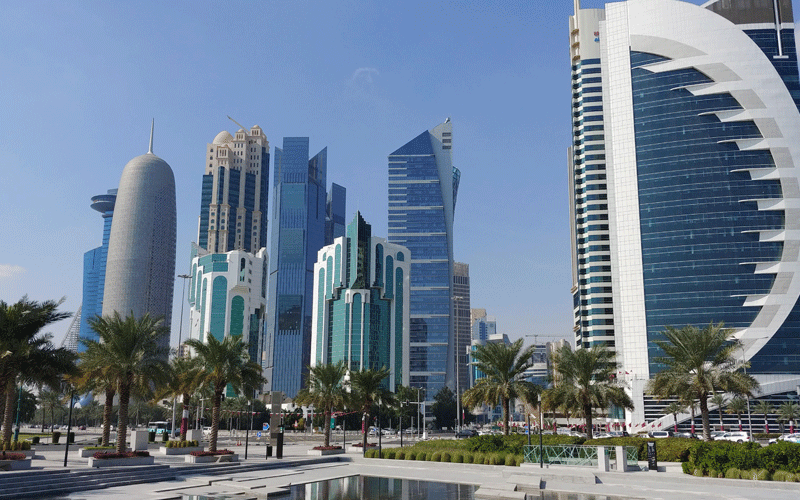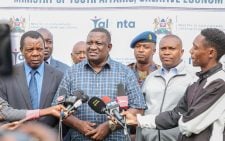Kenyans facing job violations in Qatar, HRW report reveals

Kenyans are among thousands of migrant workers employed in Qatar ahead of the FIFA 2022 World Cup facing widespread human rights violations.
In a report released by Human Rights Watch yesterday, Kenyans who sought jobs in different sectors in Qatar to escape poverty at home, found themselves wandering in the middle of wage abuses ranging from unpaid salaries, arbitrary deductions, delayed pay, withholding of funds, unpaid dues and inaccurate wages.
Human Rights Watch spoke to 93 migrant workers from different parts of the globe working for 60 different employers and companies between January 2019 and May 2020.
One of the Kenyans identified as Henry said he took a loan at 30 per cent interest rate in order to pay a recruitment agent Sh125,000 to secure a plumbing job in Qatar.
The 26-year-old man hoped that his Sh35,548 ($329) salary, food allowance, employer-paid accommodation and overtime payments for each hour of work he performed above the eight-hours a day limit, would enable him to pay back the loan and send his family some money.
Reality dawned on him when he landed in Doha in June last year after he discovered that everything he had been promised was a lie.
“The first month, Henry’s employer had no work for him, which meant there would be no pay. The second month, his employer withheld his salary as ‘security deposit’.
To feed himself and his family, Henry was forced to take more loans. Eventually, in September, he was paid for the first time. But his salary was shockingly low at only Sh24,635 ($228),” the report said.
Working 14 hours
For two months, Henry worked 14-hours a day at a hotel in Lusali city and was paid 30 per cent less wages.
“Where was my full salary? Where was the overtime money and food allowance I was owed? I was shocked, but not alone – the company had cheated 13 Kenyan workers along with me,” said Henry.
The report dubbed, ‘How Can We Work Without Wages?: Salary Abuses Facing Migrant Workers Ahead of Qatar’s FIFA World Cup 2022’ shows that the Covid-19 pandemic had made the situation worse for migrant workers leading to a spike in cases of delayed wages, unpaid salary, forceful termination, repatriation without terminal dues, delayed access to justice and arbitrary pay deductions.
Another Kenyan, Kevin said his family at home is constantly harassed to pay a loan he took to facilitate his travel to Qatar.
“I paid Sh120,000 as recruitment fees for a job in Qatar in 2017. At my salary and the overtime payment promised in the contract, I should have been able to pay it back in a year.
But you see, the company delays payments, and never pays for overtime work, so I take more loans, to feed myself and my family back home.
I keep going further and further in debt. Sometimes I think there is no way out. I will be trapped here working forever,” the 35-year-old man said.
Some of the factors that have contributed to human rights violation are the Kafala system, which ties migrant workers’ visas to their employers, deceptive recruitment practices both in Qatar and in the workers’ home countries and business practices such as “pay when paid” clause, which allows sub-contractors to delay workers’ payments until they get paid by the main contractors.
“In the worst cases, workers told Human Rights Watch that employers simply stopped paying their wages, and they often struggled to feed themselves.
Taking employers and their companies to the Labour Relations department or the Labour Dispute Resolution Committees is difficult, costly, time-consuming, ineffective, and can often result in retaliation.
Workers often describe taking legal action as a “Catch-22” situation – indebted if you do, indebted if you don’t,” the report said.
Human Rights Violations
In 2020, Qatar won the right to host the FIFA world Cup in 2022 with the initial estimates for infrastructure expenditure being as high as Sh23 trillion ($220 billion).
The Qatari government awarded 11 multi-billion dollar contracts in 2014 to international and local companies for the construction of the Doha Metro.
At least seven new state-of-the-art stadiums are being built from scratch for the 2022 event, a majority of which are under construction.
The construction of the Hamad International Airport, on 5,400 acres of land, with two of Asia’s longest runways, took over a decade and cost Sh1.7 trillion ($16 billion).
These investments have seen a surge in profits that do not trickle down to the migrant workers who are building stadiums, metro systems, highways, parking lots, bridges, hotels and other infrastructure needed to host the millions of visitors expected.
The human rights watch group is now calling for the abolishment of the Kafala system.












